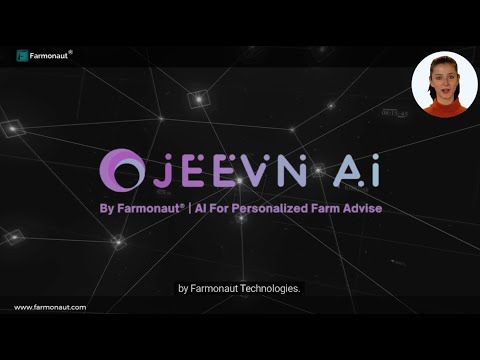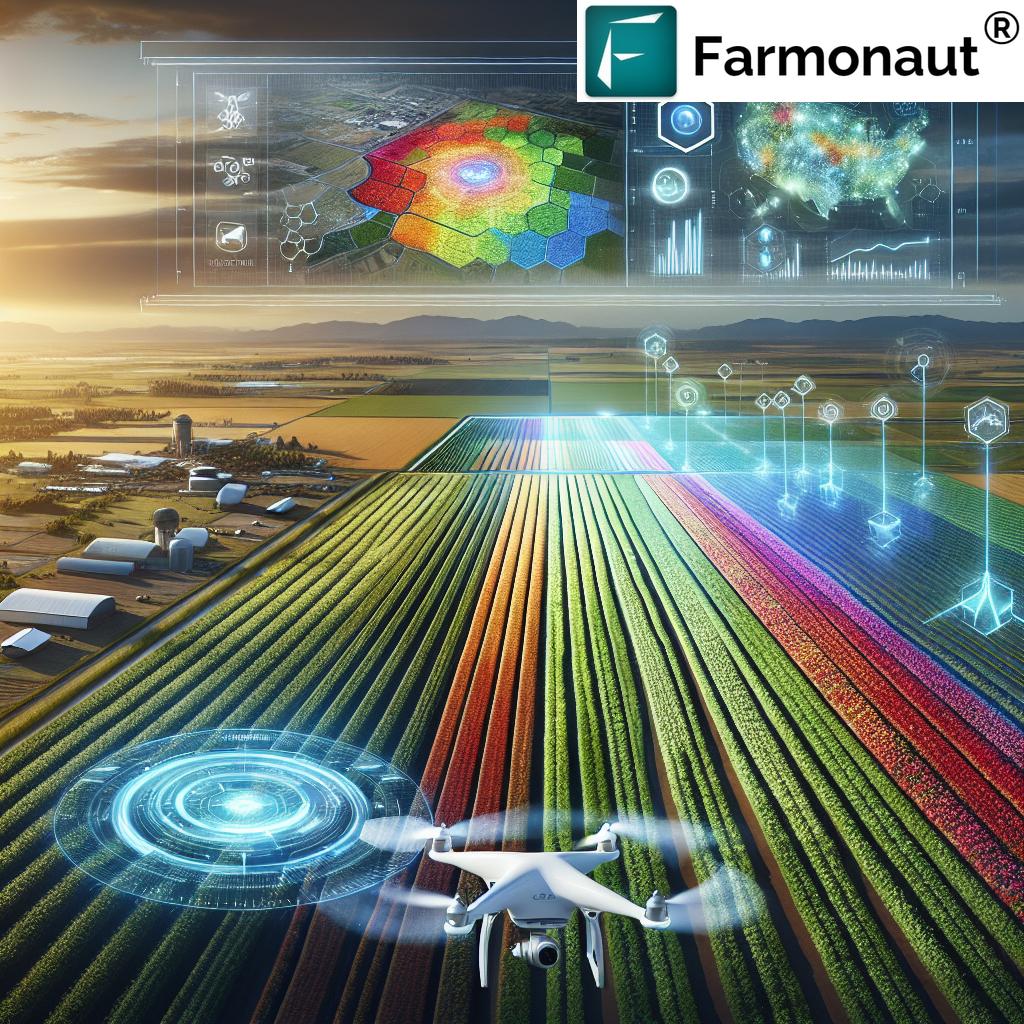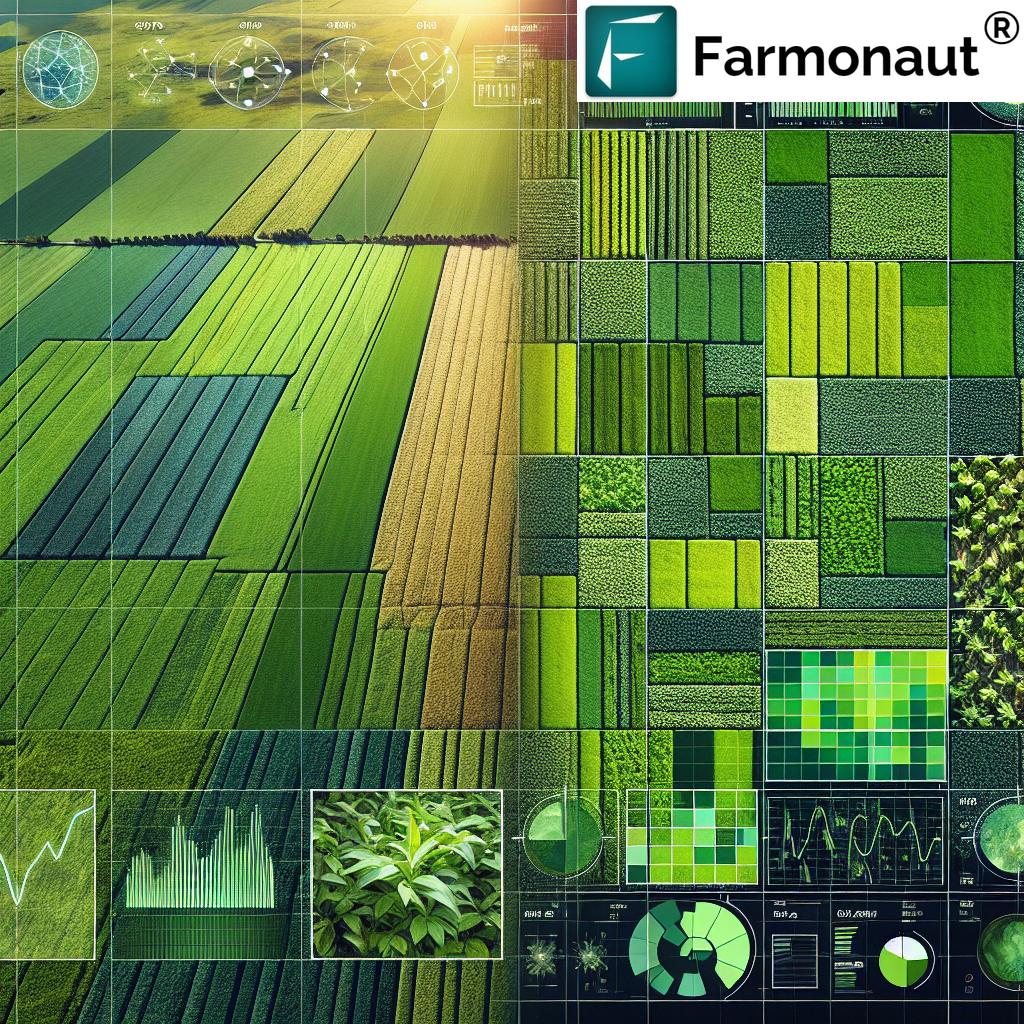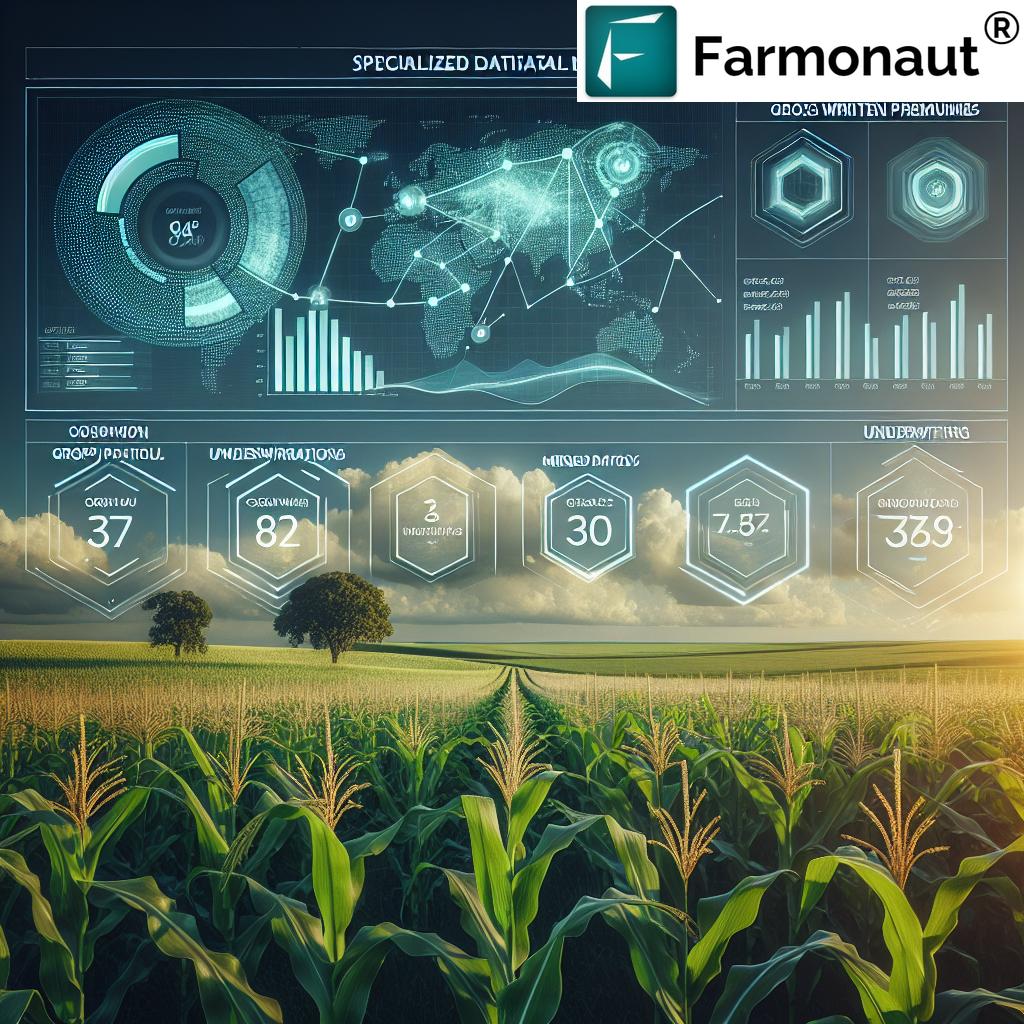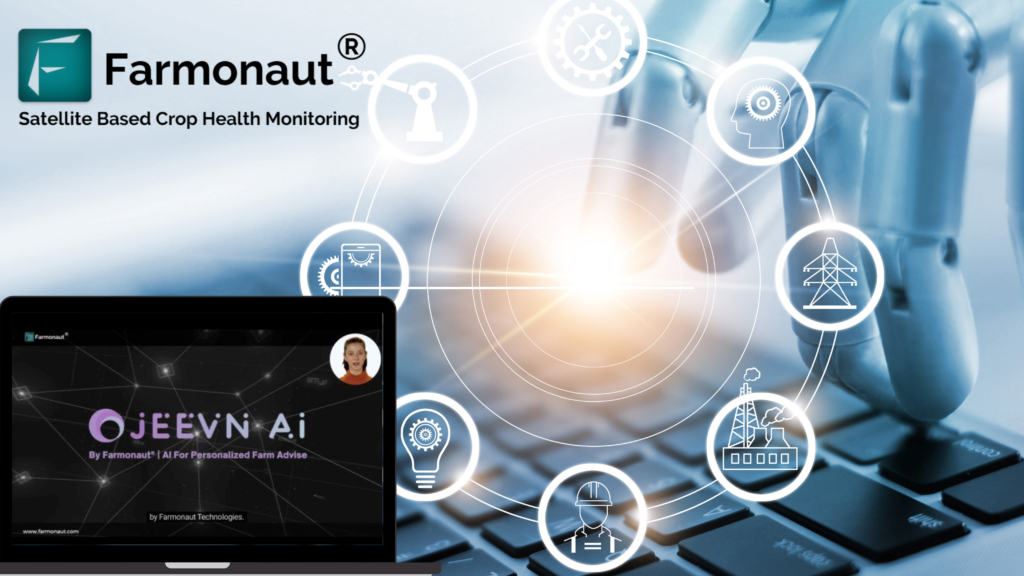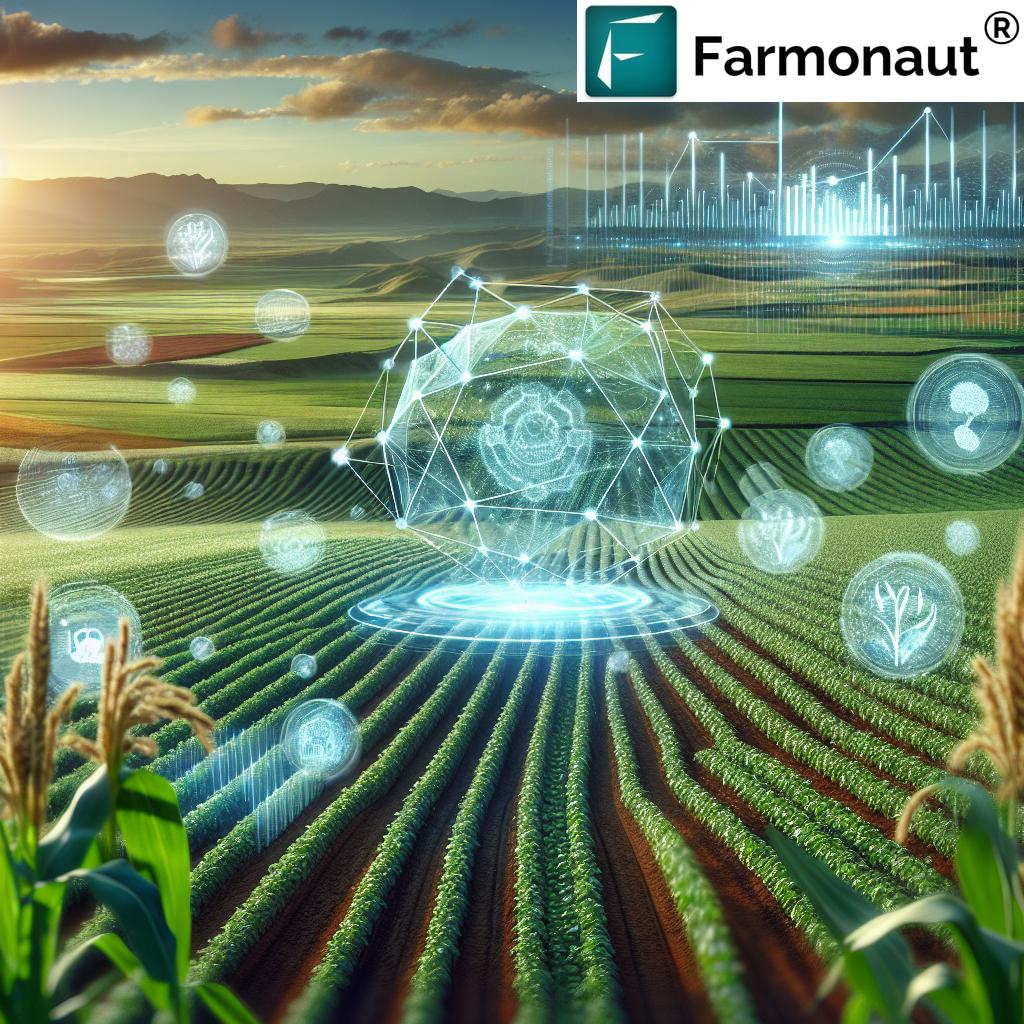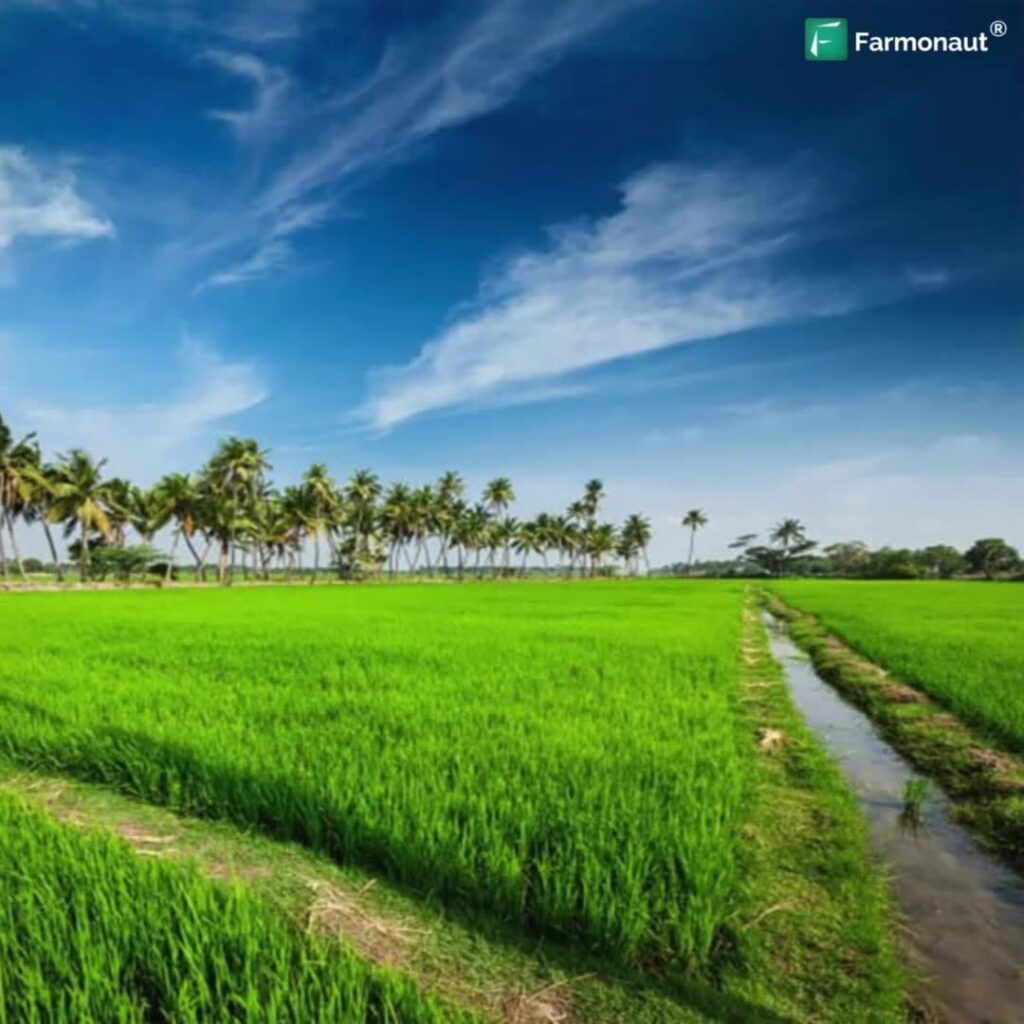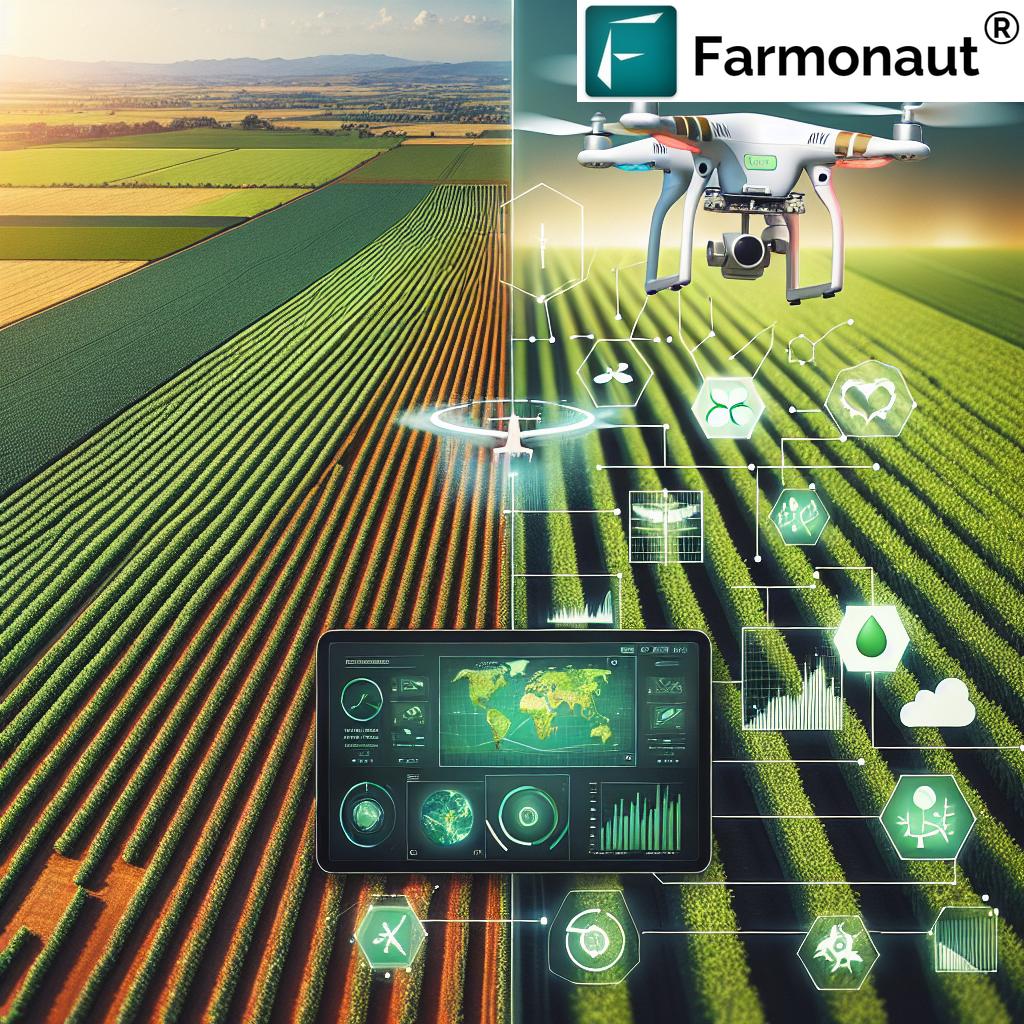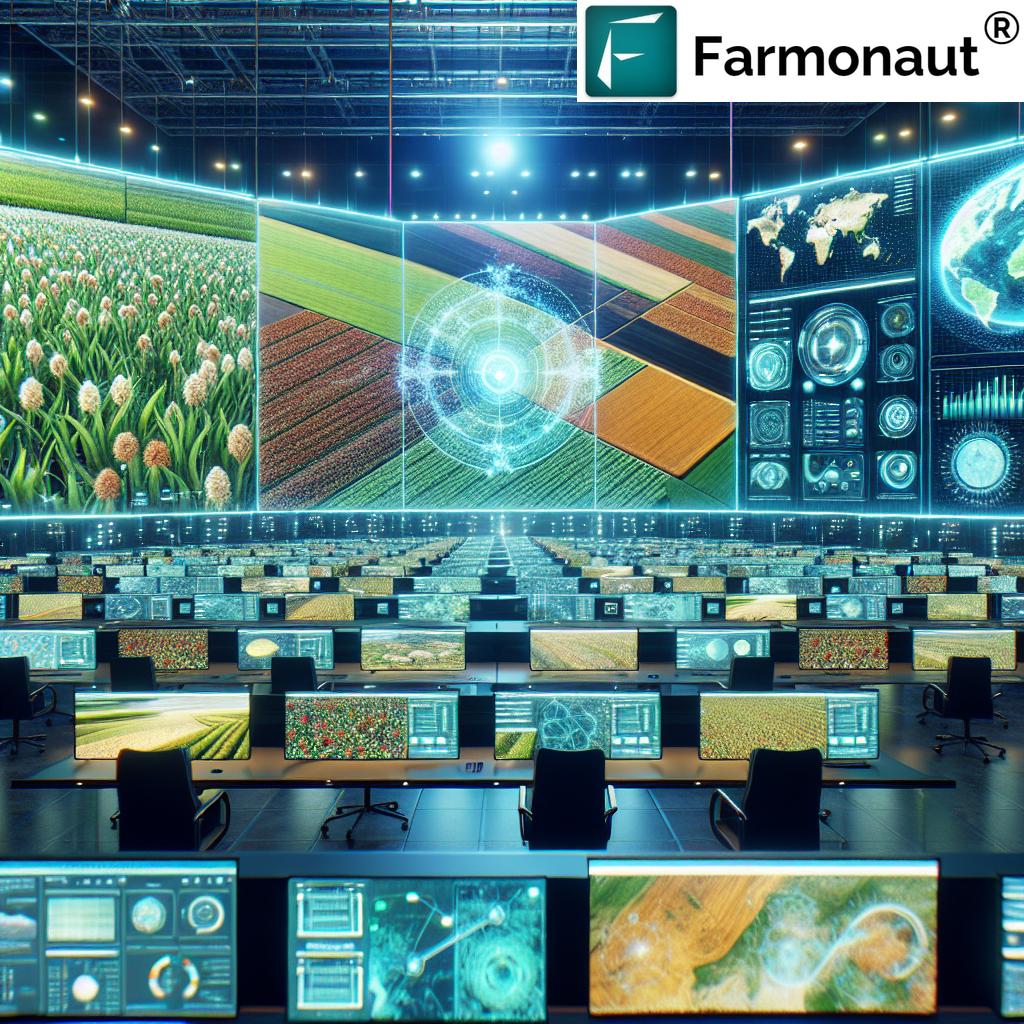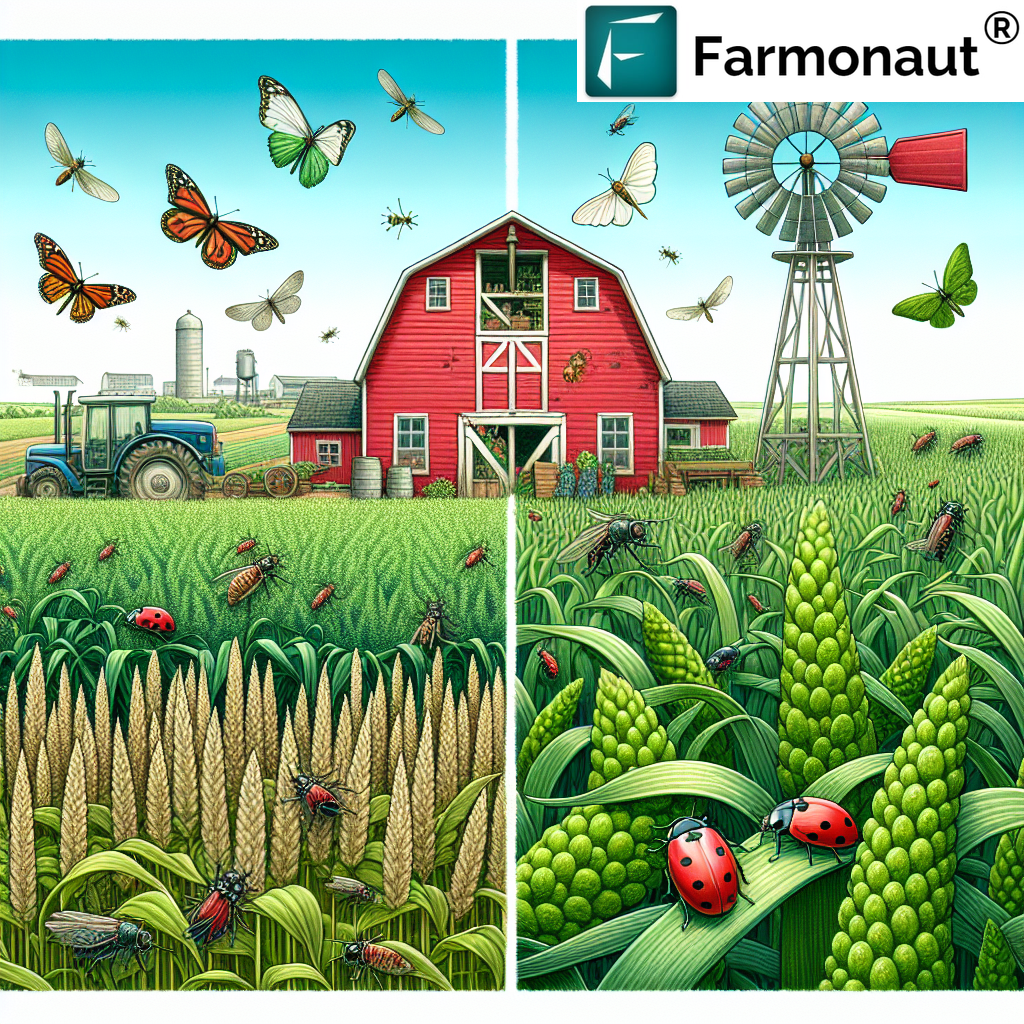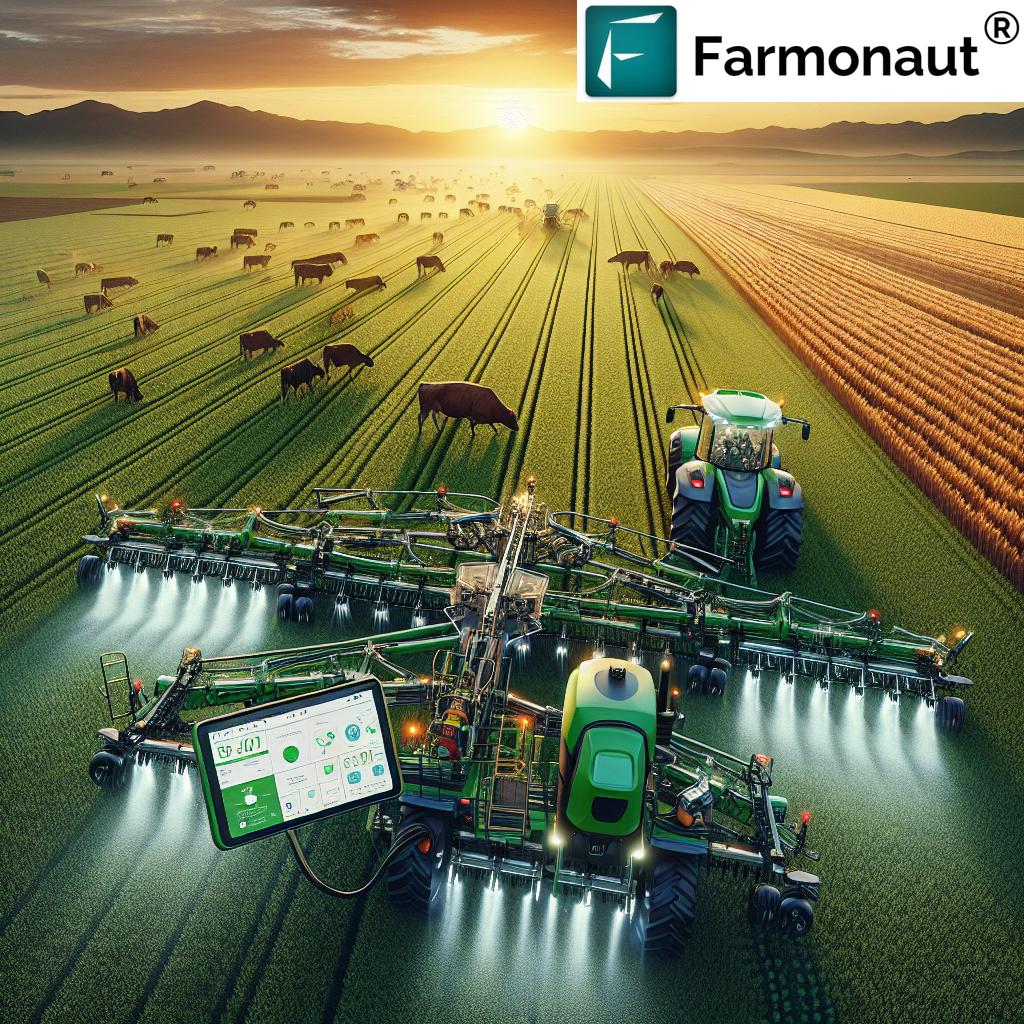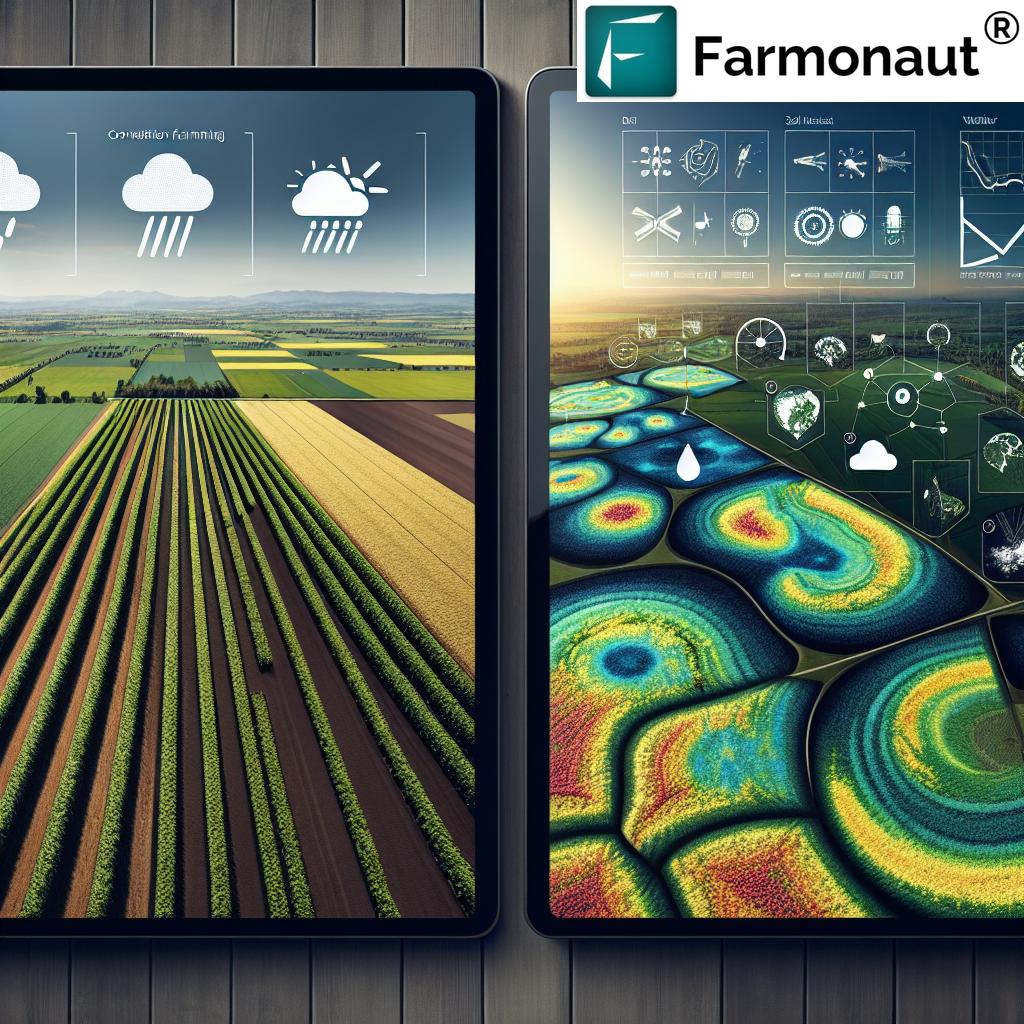Revolutionizing Agriculture: How Farmonaut’s AI-Powered Solutions Drive Sustainable Farming and Eco-Friendly Innovation
“AI-powered crop management systems can reduce water usage by up to 30% in sustainable farming practices.”
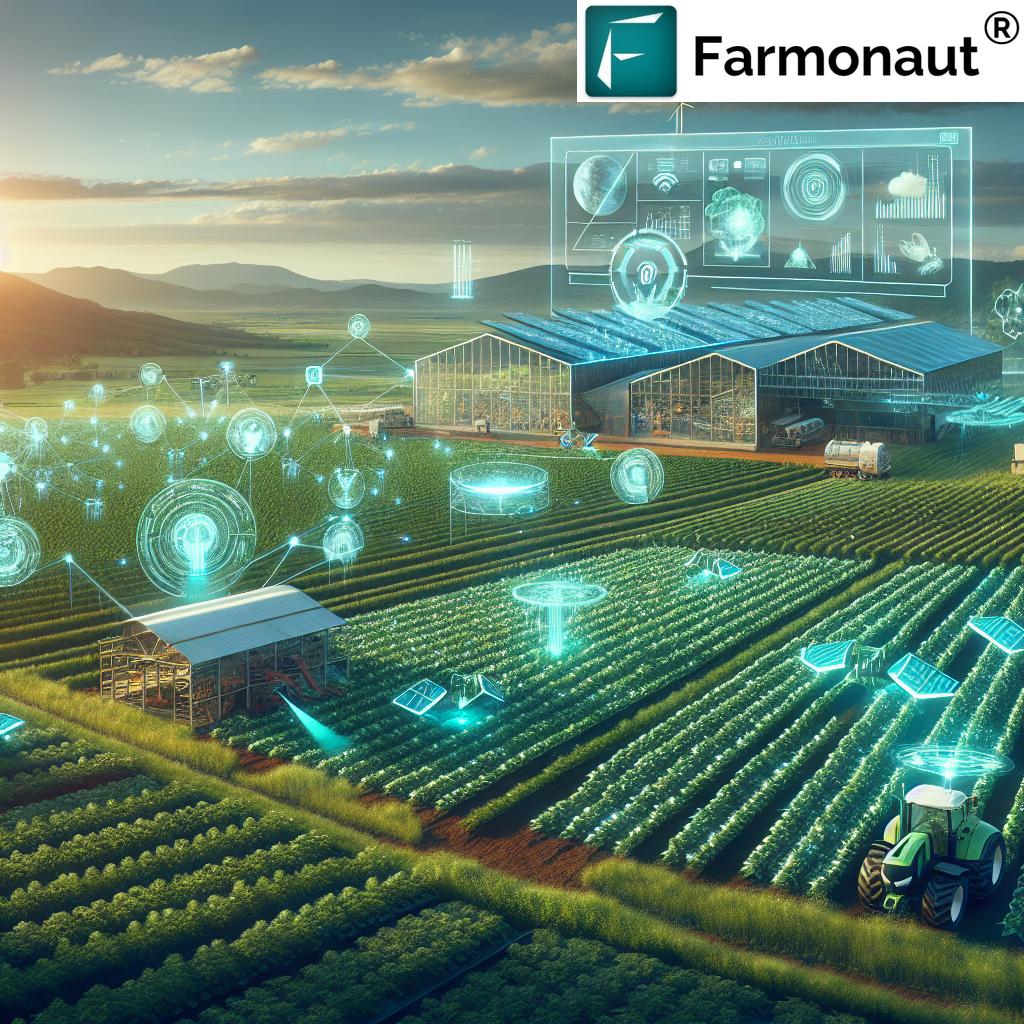
In the ever-evolving landscape of agriculture, we find ourselves at the cusp of a technological revolution that promises to reshape the future of farming. As we delve into the world of artificial intelligence in agriculture, we uncover a tapestry of innovations that are not only enhancing productivity but also championing sustainability. At the forefront of this agricultural metamorphosis stands Farmonaut, a pioneer in leveraging AI to create sustainable agtech solutions that are transforming farms across the globe.
The integration of AI into farming practices marks a significant leap towards addressing some of the most pressing challenges faced by the agricultural sector today. From optimizing resource utilization to mitigating environmental impact, the potential of AI-driven technologies in agriculture is vast and promising. However, as we embrace these advancements, it’s crucial to navigate the delicate balance between technological progress and ecological responsibility.
The Rise of AI in Agriculture: A Paradigm Shift
The agricultural landscape is undergoing a profound transformation, driven by the relentless march of technological innovation. At the heart of this revolution lies artificial intelligence, a powerful tool that’s reshaping how we approach farming in the 21st century. As we witness this paradigm shift, it’s essential to understand the multifaceted role AI plays in modern agriculture.
- Enhanced Decision-Making: AI algorithms process vast amounts of data to provide farmers with actionable insights.
- Resource Optimization: Precision farming technologies enable more efficient use of water, fertilizers, and pesticides.
- Yield Prediction: Advanced analytics help forecast crop yields with unprecedented accuracy.
- Pest and Disease Management: AI-powered systems can detect and respond to threats before they become widespread.
The integration of AI in farming is not just about increasing production; it’s about fostering a more sustainable and resilient agricultural ecosystem. As we at Farmonaut continue to develop our AI-powered solutions, we’re constantly exploring new ways to harness this technology for the benefit of farmers and the environment alike.
Farmonaut’s AI-Driven Approach to Sustainable Farming
At Farmonaut, we’ve made it our mission to revolutionize agriculture through the power of AI and satellite technology. Our suite of tools is designed to empower farmers with data-driven insights that promote sustainable practices and increase productivity. Let’s explore some of the key features that make our platform a game-changer in the realm of eco-friendly agricultural innovations.
Satellite-Based Crop Health Monitoring
Our advanced satellite imagery analysis forms the backbone of our crop health monitoring system. By leveraging multispectral data, we provide farmers with a comprehensive view of their fields’ health, including:
- Vegetation health indices (NDVI)
- Soil moisture levels
- Early detection of pest infestations and diseases
This real-time information enables farmers to make informed decisions about irrigation, fertilization, and pest control, leading to more efficient resource use and reduced environmental impact.
Jeevn AI Advisory System
Our pride and joy, the Jeevn AI Advisory System, represents the pinnacle of personalized farm management. This AI-powered tool analyzes a wealth of data to provide tailored recommendations for each farm, including:
- Optimal planting and harvesting times
- Customized irrigation schedules
- Precise fertilizer application recommendations
- Weather-based risk assessments
By following these AI-generated insights, farmers can significantly reduce waste, minimize chemical usage, and maximize their yields in an environmentally conscious manner.
Blockchain-Based Traceability
In an era where consumers are increasingly concerned about the origin and journey of their food, our blockchain-based traceability solution offers unprecedented transparency. This technology allows for:
- Secure and immutable record-keeping of each crop’s lifecycle
- Enhanced trust between producers and consumers
- Improved supply chain efficiency and reduced food waste
By implementing this system, we’re not only meeting consumer demands but also promoting more sustainable and ethical farming practices across the entire agricultural value chain.
The Environmental Impact of AI in Agriculture
While the benefits of AI in agriculture are clear, it’s crucial to address the environmental considerations that come with this technological revolution. The energy consumption of AI systems and data centers is a topic of growing concern, and as leaders in the agtech space, we at Farmonaut are committed to finding solutions that minimize our ecological footprint.
“The global AI in agriculture market is projected to reach $4 billion by 2026, driving eco-friendly innovation.”
Energy Efficiency in AI-Powered Farming
One of the primary challenges in implementing AI-driven agricultural solutions is managing the energy demands of these sophisticated systems. At Farmonaut, we’re constantly working on optimizing our algorithms and infrastructure to reduce energy consumption without compromising on performance. Some of our strategies include:
- Utilizing energy-efficient hardware in our data centers
- Implementing smart cooling systems to reduce power usage
- Exploring the use of renewable energy sources to power our operations
By focusing on energy-efficient farming practices, we aim to ensure that the benefits of AI in agriculture don’t come at the cost of increased carbon emissions.
Balancing Technological Advancement with Ecological Responsibility
As we push the boundaries of what’s possible with AI in farming, we remain acutely aware of our responsibility to the planet. Our approach to developing sustainable agtech solutions involves:
- Conducting thorough environmental impact assessments for new technologies
- Collaborating with environmental experts to ensure our solutions align with ecological best practices
- Educating farmers on the importance of sustainable farming techniques alongside AI adoption
Through these efforts, we strive to create a future where technological innovation and environmental stewardship go hand in hand.
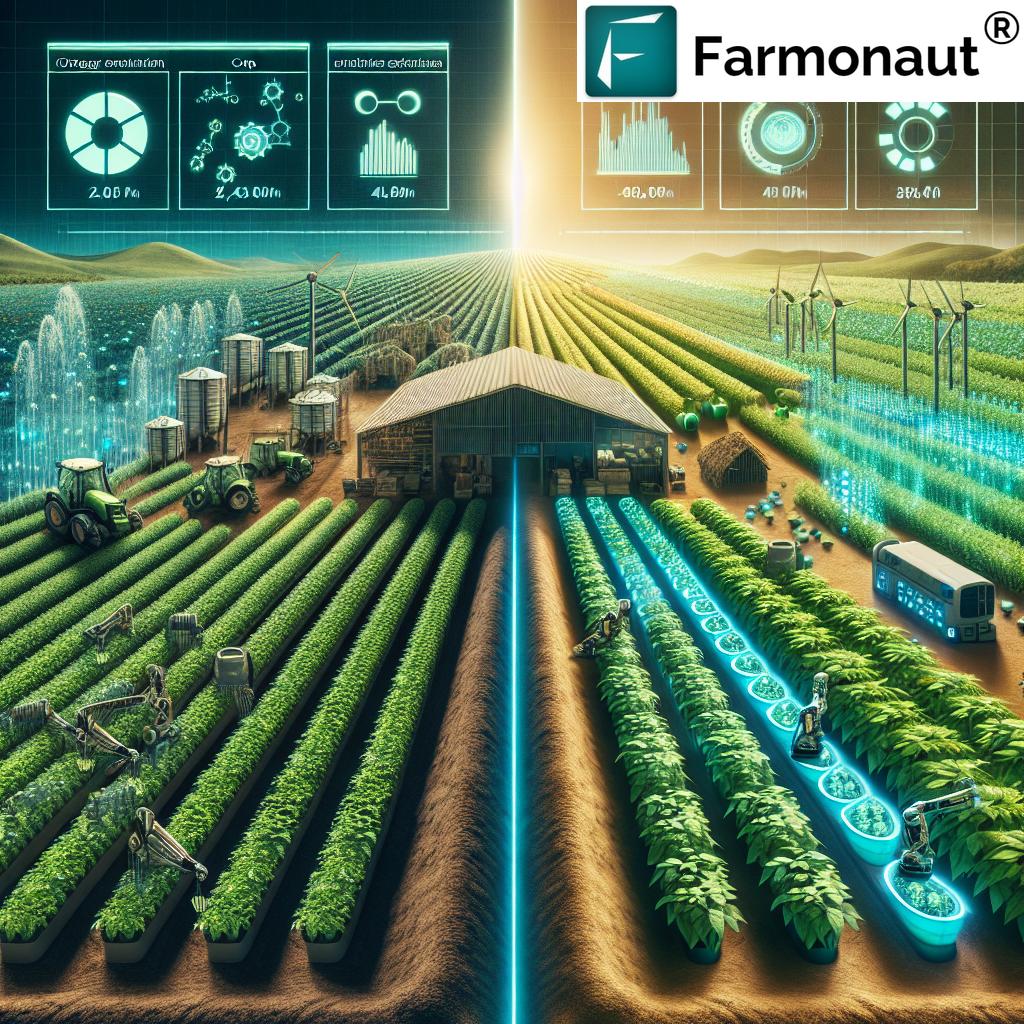
Precision Farming Technologies: The Cornerstone of Smart Agriculture
Precision farming technologies are at the heart of the agricultural revolution, and Farmonaut is leading the charge in making these tools accessible to farmers worldwide. Our platform integrates various precision farming techniques to optimize every aspect of crop production:
- Variable Rate Technology (VRT) for precise input application
- GPS-guided machinery for accurate planting and harvesting
- Drone-based imaging for detailed field analysis
- IoT sensors for real-time monitoring of soil and crop conditions
By leveraging these technologies, we enable farmers to make data-driven decisions that not only boost productivity but also promote sustainable land use and resource conservation.
The Role of AI in Precision Agriculture
AI acts as the brain behind precision farming, processing the vast amounts of data collected from various sources to generate actionable insights. Our AI-powered crop management system excels in:
- Analyzing historical and real-time data to predict optimal farming practices
- Automating decision-making processes for timely interventions
- Continuously learning and adapting to improve recommendations over time
This intelligent approach to farming allows for a level of precision and efficiency that was previously unattainable, paving the way for more sustainable and productive agricultural practices.
Smart Agriculture Education: Preparing the Next Generation of Farmers
As we witness the rapid evolution of farming technologies, it’s crucial to ensure that the next generation of farmers is equipped with the knowledge and skills needed to thrive in this new landscape. At Farmonaut, we’re committed to promoting smart agriculture education through various initiatives:
- Developing comprehensive training programs on AI in agriculture
- Partnering with educational institutions to integrate agtech into their curricula
- Offering hands-on experience with our platform through internships and workshops
- Creating accessible online resources for continuous learning
By fostering a culture of lifelong learning and technological adaptation, we’re helping to build a workforce that’s ready to tackle the agricultural challenges of tomorrow.
The Future of Farming Technology: Trends and Predictions
As we look towards the future of farming technology, several exciting trends are emerging that promise to further revolutionize agriculture:
- Advanced robotics for automated planting, weeding, and harvesting
- Gene editing technologies for developing more resilient and nutritious crops
- Vertical farming solutions for urban agriculture
- AI-driven predictive analytics for climate-resilient farming
At Farmonaut, we’re continuously exploring these emerging technologies to stay at the forefront of agricultural innovation and provide our users with cutting-edge solutions.
The Digital Transformation in Agriculture: Opportunities and Challenges
The digital transformation in agriculture is opening up a world of possibilities for increased production and capacity. However, this transformation also brings its own set of challenges that need to be addressed:
Opportunities:
- Improved resource management leading to higher yields and reduced waste
- Enhanced ability to adapt to climate change through data-driven decision making
- Creation of new job roles in agtech and data analytics
- Improved food security through more efficient and predictable farming practices
Challenges:
- Ensuring equitable access to technology for small-scale farmers
- Addressing privacy concerns related to data collection and usage
- Managing the potential job displacement due to automation
- Balancing the benefits of AI with its energy consumption and environmental impact
At Farmonaut, we’re committed to addressing these challenges head-on, working tirelessly to create solutions that are not only technologically advanced but also socially responsible and environmentally sustainable.
Mitigating the Environmental Impact of Agricultural AI
As we continue to harness the power of AI in agriculture, it’s crucial to address the environmental impact of agricultural AI. At Farmonaut, we’re implementing several strategies to minimize our ecological footprint:
- Investing in energy-efficient hardware and data centers
- Optimizing our algorithms to reduce computational demands
- Exploring the use of edge computing to decrease data transfer and processing needs
- Partnering with renewable energy providers to power our operations
By taking these steps, we aim to ensure that the benefits of AI in agriculture don’t come at the cost of increased environmental degradation.
Ethical Considerations in AI-Driven Agriculture
As we push the boundaries of what’s possible with AI in farming, it’s essential to consider the ethical implications of these advancements. Some key areas of focus include:
- Data privacy and security for farmers using AI-powered platforms
- Ensuring fair access to AI technologies across different scales of farming operations
- Transparency in AI decision-making processes affecting crop management
- Addressing potential biases in AI algorithms that could impact agricultural practices
At Farmonaut, we’re committed to addressing these ethical concerns proactively, ensuring that our technologies serve to empower farmers rather than create new disparities.
The Road Ahead: Sustainable Innovation in Agriculture
As we look to the future, the path forward for agriculture is clear: sustainable innovation powered by AI and other cutting-edge technologies. At Farmonaut, we’re dedicated to leading this charge, constantly pushing the boundaries of what’s possible in eco-friendly agricultural innovations.
Our commitment to sustainability extends beyond our products and services. We’re actively working to educate and empower farmers, policymakers, and consumers about the importance of sustainable agriculture and the role technology can play in achieving it.
By combining the power of AI with a deep respect for our planet’s ecosystems, we believe we can create a future where agriculture not only feeds the world but also helps to heal it.
Conclusion: Embracing a Sustainable, AI-Powered Agricultural Future
As we’ve explored throughout this article, the integration of AI in agriculture represents a monumental shift in how we approach farming. From precision farming technologies to AI-powered crop management systems, the potential for increasing productivity while promoting sustainability is immense.
At Farmonaut, we’re proud to be at the forefront of this agricultural revolution, providing farmers with the tools they need to thrive in an increasingly complex and challenging environment. Our commitment to sustainable agtech solutions drives everything we do, from developing energy-efficient AI algorithms to promoting smart agriculture education.
As we continue to innovate and push the boundaries of what’s possible in agriculture, we remain mindful of our responsibility to the planet and future generations. By balancing technological advancement with ecological stewardship, we believe we can create a more sustainable, productive, and resilient agricultural sector.
The future of farming is here, and it’s powered by AI. Join us at Farmonaut as we work towards a greener, more sustainable tomorrow.
FAQ Section
- What is AI in agriculture?
AI in agriculture refers to the use of artificial intelligence technologies such as machine learning, computer vision, and predictive analytics to improve various aspects of farming, from crop monitoring to resource management. - How does Farmonaut use AI to promote sustainable farming?
Farmonaut leverages AI through its satellite-based crop health monitoring, Jeevn AI Advisory System, and precision farming technologies to optimize resource use, reduce waste, and increase crop yields sustainably. - What are the environmental benefits of AI in agriculture?
AI can help reduce water usage, minimize pesticide application, optimize energy consumption, and improve overall resource efficiency in farming, leading to more sustainable agricultural practices. - How does Farmonaut address the energy consumption concerns of AI?
Farmonaut is committed to developing energy-efficient algorithms, using sustainable data centers, and exploring renewable energy sources to minimize the environmental impact of our AI technologies. - What is precision farming, and how does Farmonaut support it?
Precision farming involves using data and technology to optimize crop yields. Farmonaut supports this through its AI-powered crop management system, satellite imagery analysis, and personalized farm advisory services.
AI-Powered Agricultural Solutions: Sustainability Comparison
| Farming Aspect | Traditional Method | AI-Powered Solution |
|---|---|---|
| Water Usage | High | Low (30% reduction) |
| Pesticide Application | Frequent, broad-spectrum | Targeted, as-needed |
| Energy Consumption | Medium | Variable (depends on implementation) |
| Crop Yield | Variable | Increased (10-20% on average) |
| Soil Health | Often degraded over time | Improved through precise management |
| Carbon Footprint | High | Reduced (varies by implementation) |
Ready to revolutionize your farming practices with AI-powered solutions? Explore Farmonaut’s offerings today:
For developers interested in integrating our powerful AI and satellite data into their own applications, check out our API and API Developer Docs.



